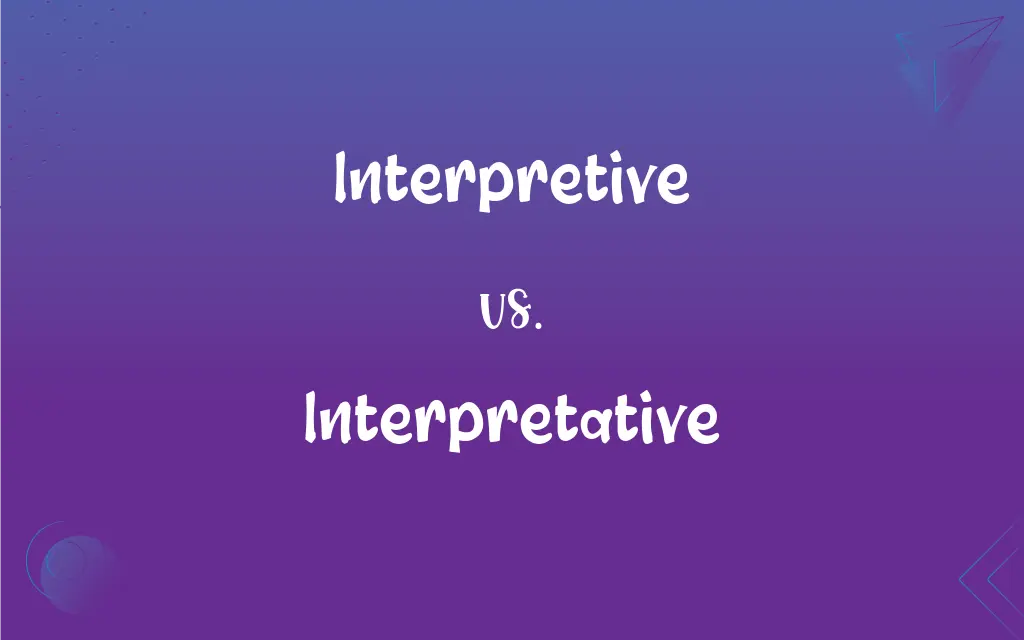Interpretive vs. Interpretative: What's the Difference?
Edited by Aimie Carlson || By Janet White || Published on March 2, 2024
Interpretive and interpretative are synonyms, both meaning related to or providing an interpretation, with no significant difference in usage or meaning.

Key Differences
Interpretive and interpretative are two adjectives that are often used interchangeably in the English language. Both words are derived from the verb "interpret," which means to explain or understand the meaning of something. Interpretive and interpretative are used to describe something that is related to or involves interpretation.
The primary difference between the two words is their usage in different regions. Interpretive is more commonly used in American English, while interpretative is more commonly used in British English. However, this distinction is not strict, and both forms can be found in both varieties of English.
In terms of meaning, there is no significant difference between interpretive and interpretative. Both words are used to describe an act or process of interpreting, such as in the phrases "interpretive dance" or "interpretative framework." They can also be used to describe something that requires interpretation, such as "interpretive art" or "interpretative literature."
Some argue that there might be a subtle difference in connotation between the two words. Interpretive is sometimes seen as focusing more on the act of interpreting itself, while interpretative is thought to emphasize the result or product of interpretation. However, this distinction is not widely recognized and is not consistently applied.
Interpretive and interpretative are essentially synonymous and can be used interchangeably in most contexts. The choice between the two often comes down to personal preference or regional usage, rather than any significant difference in meaning.
ADVERTISEMENT
Comparison Chart
Regional Usage
More common in American English
More common in British English
Focus
Slightly more on the act of interpreting
Slightly more on the result of interpretation
Frequency in Literature
Commonly used
Commonly used
Usage in Academic Fields
Used in fields like psychology, anthropology
Used in fields like psychology, anthropology
Application in Arts
Used to describe interpretive dance, art
Used to describe interpretative dance, art
ADVERTISEMENT
Interpretive and Interpretative Definitions
Interpretive
Relating to the act of explaining or understanding the meaning of something.
The interpretive guide provided insightful explanations of the historical artifacts.
Interpretative
Involving the use of interpretation to convey a message or perform.
The interpretative theater performance brought the play's characters to life.
Interpretive
Involving the use of interpretation to convey a message or perform.
The interpretive dance was a beautiful expression of the dancer's emotions.
Interpretative
Pertaining to a method or approach that emphasizes interpretation.
The interpretative analysis revealed new insights into the study.
Interpretive
Pertaining to a method or approach that emphasizes interpretation.
The interpretive framework was crucial for analyzing the data.
Interpretative
Describing something that requires an interpreter to understand.
The interpretative tools were essential for decoding the ancient text.
Interpretive
Associated with the personal or subjective understanding of something.
The interpretive nature of art criticism leads to diverse opinions.
Interpretative
Relating to the act of explaining or understanding the meaning of something.
The interpretative comments enhanced our comprehension of the poem.
Interpretive
Describing something that requires an interpreter to understand.
The interpretive signs at the museum helped visitors grasp the significance of the exhibits.
Interpretative
Associated with the personal or subjective understanding of something.
The interpretative approach to history emphasizes the historian's perspective.
Interpretive
Relating to or marked by interpretation; explanatory.
Interpretative
Relating to or marked by interpretation; explanatory.
Interpretive
Interpretative.
Interpretative
Marked by interpretation.
Interpretive
That provides interpretation
Interpretative
Designed or fitted to interpret; explanatory.
Interpretative
According to interpretation; constructive.
An interpretative siding with heresies.
Interpretative
That provides interpretation
FAQs
What is the meaning of interpretative?
Interpretative means relating to the act of explaining or understanding the meaning of something, similar to interpretive.
Is interpretative used in the arts?
Yes, interpretative is used in the arts, such as in interpretative dance or theater, to describe performances that involve interpretation.
Is there a regional preference for using interpretive or interpretative?
Yes, interpretive is more commonly used in American English, while interpretative is more common in British English.
Can interpretive be used in an academic context?
Yes, interpretive is often used in academic fields like psychology and anthropology to describe approaches that emphasize interpretation.
What is the difference in focus between interpretive and interpretative?
Interpretive may slightly focus more on the act of interpreting, while interpretative may emphasize the result or product of interpretation, though this distinction is not widely recognized.
Can interpretive be used to describe art?
Yes, interpretive can be used to describe art that requires interpretation to understand its meaning.
What is the meaning of interpretive?
Interpretive means relating to the act of explaining or understanding the meaning of something.
How is interpretive used in literature?
Interpretive is used in literature to describe analyses or critiques that involve interpretation of texts.
Are interpretive and interpretative interchangeable?
Yes, interpretive and interpretative are synonyms and can be used interchangeably in most contexts.
Can interpretative be used in psychology?
Yes, interpretative is used in psychology to describe approaches or theories that focus on interpreting human behavior and thoughts.
What is an interpretive framework?
An interpretive framework is a method or approach that guides the interpretation of data or information.
Is there a significant difference in meaning between interpretive and interpretative?
No, there is no significant difference in meaning between interpretive and interpretative; they are essentially synonymous.
How do interpretive and interpretative relate to subjective understanding?
Both interpretive and interpretative are associated with subjective understanding, as they involve personal or individual interpretation.
Are there any contexts where interpretive and interpretative cannot be used interchangeably?
In most contexts, interpretive and interpretative can be used interchangeably, but specific disciplinary conventions may dictate the use of one term over the other.
Is there a preference for interpretive or interpretative in scientific research?
In scientific research, the preference between interpretive and interpretative may depend on the specific field and the nature of the study.
How can interpretative be applied in anthropology?
In anthropology, interpretative approaches can be used to understand cultural practices and beliefs through the lens of interpretation.
Can interpretive be used in the context of music?
Yes, interpretive can be used in the context of music to describe performances or analyses that involve interpretation of musical works.
Is there a difference in usage between interpretive and interpretative in academic writing?
In academic writing, both terms are used, but the choice may depend on regional preferences or specific disciplinary conventions.
What is an example of an interpretive method?
An example of an interpretive method is qualitative research, where data is analyzed through interpretation to understand social phenomena.
What is an interpretative strategy in education?
An interpretative strategy in education is a teaching approach that encourages students to interpret and analyze information or texts.
About Author
Written by
Janet WhiteJanet White has been an esteemed writer and blogger for Difference Wiki. Holding a Master's degree in Science and Medical Journalism from the prestigious Boston University, she has consistently demonstrated her expertise and passion for her field. When she's not immersed in her work, Janet relishes her time exercising, delving into a good book, and cherishing moments with friends and family.
Edited by
Aimie CarlsonAimie Carlson, holding a master's degree in English literature, is a fervent English language enthusiast. She lends her writing talents to Difference Wiki, a prominent website that specializes in comparisons, offering readers insightful analyses that both captivate and inform.































































